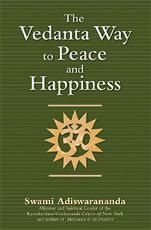"Self-control and self-regulation represent respectively dispassion and practice — the two disciplines prescribed by the Bhagavad Gita (6.35) for overcoming restlessness of mind. The two must be followed simultaneously. Unless one practices control, one cannot succeed in regulation, and unless one regulates the mind, one cannot succeed in controlling it. Control without regulation never becomes lasting. Egocentric control does not stand the test of stress. On the other hand, regulation without control is dangerous. An uncontrolled mind is impure, and an impure mind, when roused through concentration, becomes destructive. A Sanskrit proverb says: 'To feed a cobra with milk without first taking out its poison fangs is only to increase its venom.' Again, control and regulation are to be practiced repeatedly, in thought, word, and deed, for a long time, without break, and with devotion. The psychology of repeated practice is to neutralize the deep-seated, distracting samskaras by developing counter-samskaras. Impure thought is countered by pure thought, impure imagination by pure imagination, uncontrolled speech by thoughtful speech, bad posture by good posture. A thought when repeated becomes a tendency, a tendency when repeated becomes a habit, and a habit when repeated becomes a character. So Swami Vivekananda says: 'Never say any man is hopeless, because he only represents a character, a bundle of habits, which can be checked by new and better ones. Character is repeated habits, and repeated habits alone can reform character.'
"The fourth aspect of facing the mind is moderation. The mind cannot be brought under control all of a sudden. Human nature cannot be hurried. Old habits die hard. They have deep roots and cannot be overcome all at once. The word habit has five letters. If the letter h is taken away, what remains is 'a bit.' If both the h and the a are taken away, 'bit' remains. Even when h, a, and b are taken away, still 'it' remains! A habit is formed bit by bit. So a counterhabit is to be developed bit by bit. If you drive a screw into a wall by a number of turns, you cannot simply pull it out. In order to remove it, you have to give the same number of turns in the opposite direction. The intensity of our effort to develop a counterhabit must be in keeping with the capacity of our mind to endure. Effort when too weak and casual fails to change the habits, but when it is too intense and accelerated, it can damage the mind itself.
No task is more urgent than gaining mastery over the mind by overcoming its restlessness. No sacrifice is too great to achieve this goal. No effort in this venture is ever lost or wasted. Success in self-mastery comes only to those who long for it, practice it, and preserve in their practice. Practice, however, is not talking, discussing, or debating but doing, and the secret of all doing is simply to do."
